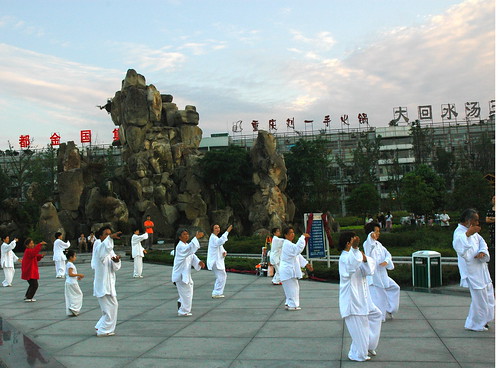
I've been thinking about this topic recently because I've begun to feel that something was missing in my practice. When I first started my Buddhist practice, I was concurrently training in Aikido, a Japanese martial art. While my meditation practice is stronger today than it was then, I'm finding that its effect on my life is reduced. One cause is undoubtedly a more complex life today than I had then. However, the more I examine the situation, the more I see that another primary cause is my lack of a physical expression of my practice.
In Aikido, training centers around control of one's self. Aikido is based on a sphere, with the practitioner at the center. As attackers enter that sphere, aikidoka must maintain their awareness such that they can touch, and thereby redirect--with the minimum possible force--the attacker around that sphere. When one watches high-level Aikido, it often appears as a sort of dance, with the practitioners feeling the attack and moving WITH said attack, never forcefully AGAINST it. Furthermore, Aikido trains you to feel what others are doing to you, and teaches you how to go with that flow to avoid personal injury. If you are about to be thrown, and there is no true way to avoid that, it is healthier to allow yourself to be thrown and focus on protecting yourself than to strain to avoid the throw.
The only way to succeed in such practice is to lose your ego. Ego causes you to think, "Resist! He's not going to get the better of me!" Then when you do, you sprain your wrist in the process. Without ego, you realize, "I've recognized this throw too late for a skillful counter; therefore, I must bend like the willow tree and absorb the throw, landing with minimal injury." Ego causes you to think, "Strike harder! He deserves to be hurt!" Without ego, you realize, "He is striking me out of his ego; there is no need to inflict major injury. Respond with the minimal force necessary." Beyond philosophy, however, you learn very quickly when training in Aikido that when you use muscular force, your moves are ineffective. So not only does Aikido philosophy teach these principles, the physical component provides proof. To be blunt, your Aikido will be completely ineffective and worthless if you respond to force with force, to attack with defiant resistance. In other words, Aikido acts as a physical expression of the value of egolessness, compassion, and wisdom.
Having not trained in Aikido for 5 years, I find that loss to have had an effect on my life. Such physical expression of one's practice helps to bring one's practice "out of the dojo" or "off the cushion" into everyday life. What good is meditation and Buddhist training if you leave your practice in the temple after service? The Buddha did not teach any particular physical expressions of the practice. Therefore, to me this indicates that such practices are not strictly necessary. However, in that they involve the physical body your mind inhabits in this life, I think they provide a skillful means by which to "practice in motion." Walking meditation is often touted as a great means to bring your meditation to physical activity. A lay person's life involves much motion, and if he cannot figure out how to bring a meditative mind to his actions in life, his practice will be worthless.
Therefore, I have begun studying Yoga at a highly respected studio here in Chicago, Yogaview. So far--and it's only been 2 weeks--I've already noticed an increase in my ability to carry the mental state of mindful awareness to my motion-filled life. So while I don't think such physical expression of training is required to achieve Awakening, I think if you are disposed to such practice, it can act as a skillful method to improve your practice dramatically.




0 comments:
Post a Comment